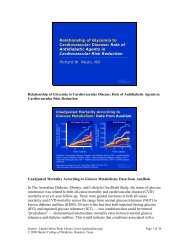Collaborative Atorvastatin Diabetes Study (CARDS) - Lipids Online
Collaborative Atorvastatin Diabetes Study (CARDS) - Lipids Online
Collaborative Atorvastatin Diabetes Study (CARDS) - Lipids Online
You also want an ePaper? Increase the reach of your titles
YUMPU automatically turns print PDFs into web optimized ePapers that Google loves.
<strong>Collaborative</strong> <strong>Atorvastatin</strong> <strong>Diabetes</strong> <strong>Study</strong> (<strong>CARDS</strong>)<br />
Commentary by Harold Bays, MD, FACP<br />
<strong>CARDS</strong>: Effect of <strong>Atorvastatin</strong> on the Primary<br />
Endpoint: Major CV Events Including Stroke<br />
Cumulative Hazard, (%)<br />
Placebo<br />
<strong>Atorvastatin</strong><br />
15<br />
10<br />
5<br />
Relative Risk Reduction 37% (95% CI, 17–52)<br />
P = 0.001<br />
Placebo<br />
127 events<br />
0<br />
0 1 2 3 4<br />
Years<br />
1410<br />
1428<br />
1351<br />
1392<br />
Colhoun HM et al. Lancet 2004;364:685-696.<br />
Reprinted with permission from Elsevier.<br />
1306<br />
1361<br />
1022<br />
1074<br />
<strong>Atorvastatin</strong><br />
83 events<br />
651<br />
694<br />
4.75<br />
305<br />
328<br />
Slide Source:<br />
<strong>Lipids</strong> <strong>Online</strong> Slide Library<br />
www.lipidsonline.org<br />
<strong>CARDS</strong>: Adverse and Serious Adverse Events<br />
Type of Event<br />
Serious adverse event<br />
possibly associated<br />
with study drug<br />
Discontinued for AE<br />
Rhabdomyolysis<br />
Myopathy AE report<br />
CPK ≥10 × ULN<br />
ALT ≥3 × ULN<br />
AST ≥3 × ULN<br />
Patients (%) with Event<br />
Placebo<br />
(n = 1410)<br />
20 (1.1%)<br />
145 (10%)<br />
0<br />
1 (0.1%)<br />
10 (0.7%)<br />
14 (1%)<br />
4 (0.3%)<br />
<strong>Atorvastatin</strong> 10 mg<br />
(n = 1428)<br />
19 (1.1%)<br />
122 (9%)<br />
0<br />
1 (0.1%)<br />
2 (0.1%)<br />
17 (1%)<br />
6 (0.4%)<br />
Colhoun HM et al. Lancet 2004;364:685-696.<br />
Slide Source:<br />
<strong>Lipids</strong> <strong>Online</strong> Slide Library<br />
www.lipidsonline.org<br />
Implications and Clinical Relevance<br />
<strong>CARDS</strong> showed that in patients with type 2 diabetes mellitus with lower LDL-C levels, atorvastatin 10 mg<br />
daily was safe, well tolerated, and significantly efficacious in reducing the risk of first CHD events.<br />
<strong>CARDS</strong> supports recommendations such as that made by the American <strong>Diabetes</strong> Association that patients<br />
with type 2 diabetes mellitus should be considered as candidates for statin treatment—even at lower LDL-C<br />
levels. Subgroup analysis revealed that irrespective of whether the baseline LDL-C was at or above, or<br />
below the median of 120 mg/dL, atorvastatin patients in both subgroups had similar relative risk reductions<br />
of 37–38% for the primary endpoint.<br />
Previous support for the benefits of statin therapy in diabetes patients had been derived from the<br />
extrapolation of data from primary and secondary CHD prevention trials that included nondiabetic<br />
populations. Because <strong>CARDS</strong> was the first study to evaluate statin therapy prospectively and specifically<br />
in patients with type 2 diabetes mellitus, and because it was one of the few primary prevention trials<br />
<strong>Collaborative</strong> <strong>Atorvastatin</strong> <strong>Diabetes</strong> <strong>Study</strong> (<strong>CARDS</strong>)<br />
Baylor College of Medicine, Houston, Texas Page 4 of 5



